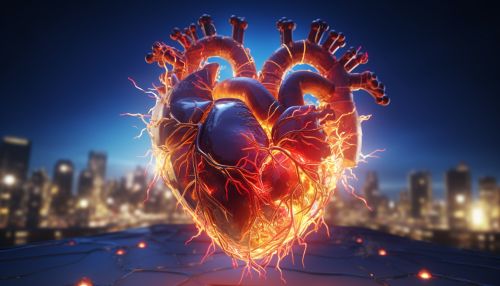Heart block
Introduction
Heart block, also known as atrioventricular (AV) block, is a condition where the electrical signals that control the heartbeat are partially or completely blocked from reaching the ventricles. This condition can be classified into three types: first-degree, second-degree, and third-degree heart block, each with varying degrees of severity and symptoms.
Types of Heart Block
First-Degree Heart Block
First-degree heart block, the mildest form, is characterized by a delay in the transmission of electrical impulses from the atria to the ventricles. This delay is typically asymptomatic and is often discovered incidentally during an electrocardiogram (ECG).
Second-Degree Heart Block
Second-degree heart block is further divided into two types: Mobitz Type I (Wenckebach block) and Mobitz Type II. In Mobitz Type I, the electrical signals are increasingly delayed until one signal fails to reach the ventricles. This type is generally benign and may not cause significant symptoms. Mobitz Type II, on the other hand, is characterized by the unpredictable blocking of some signals. This type is more serious and may progress to third-degree heart block.
Third-Degree Heart Block
Third-degree heart block, also known as complete heart block, is the most severe form. In this type, none of the electrical signals from the atria reach the ventricles. This results in the atria and ventricles beating independently, leading to a slow and inefficient heartbeat. This condition can be life-threatening and often requires immediate treatment, typically in the form of a pacemaker implantation.


Causes
Heart block can be caused by a variety of conditions that damage the heart's electrical system. These include coronary artery disease, heart attack, cardiomyopathy, and certain genetic conditions. Other potential causes include certain medications, such as beta-blockers and calcium channel blockers, and surgical procedures involving the heart.
Symptoms
The symptoms of heart block depend on the type and severity of the block. Some people with first-degree or second-degree Mobitz Type I heart block may not experience any symptoms. However, those with Mobitz Type II or third-degree heart block may experience symptoms such as fainting, dizziness, fatigue, shortness of breath, and chest pain.
Diagnosis
Heart block is typically diagnosed through an ECG, which records the electrical activity of the heart. Other diagnostic tests may include a Holter monitor, which records the heart's electrical activity over a 24-hour period, and an exercise stress test, which monitors the heart's activity during physical exertion.
Treatment
The treatment of heart block depends on the type and severity of the condition. First-degree heart block and second-degree Mobitz Type I heart block often do not require treatment. However, those with Mobitz Type II or third-degree heart block may require a pacemaker. A pacemaker is a small device that's placed under the skin in your chest to help control your heartbeat.
Prognosis
With appropriate treatment, individuals with heart block can lead normal, healthy lives. However, it's important for those with the condition to regularly monitor their heart health and follow their healthcare provider's recommendations for managing the condition.
